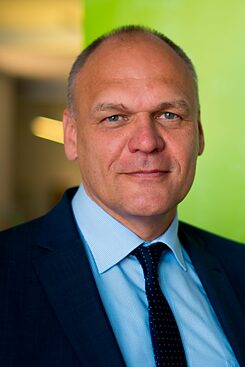Brexit
Strengthening European ideas

As of 31 January 2020, the United Kingdom of Great Britain is no longer part of the European Union. The Goethe-Institut, which has been committed to German-British cultural dialogue for over sixty years, is responding by working even more closely with British and European partners.
 Johannes Ebert, Secretary-General of the Goethe-Institut.
| Photo (detail): © dpa / Monika Skolimowska
Johannes Ebert, Secretary-General of the Goethe-Institut, said, “Britain’s exit from the EU is now a reality. Of course, this is very painful for the Goethe-Institut, which sees itself as a European institution. Nevertheless, Brexit has not arrived suddenly, so we have dealt intensively with its consequences for dialogue in the cultural and educational sector in advance and held numerous discussions with our British partners. We will now respond to this with programmes that are intended to strengthen European ideas beyond EU membership and in particular to promote personal exchange between the British and Germans.”
Johannes Ebert, Secretary-General of the Goethe-Institut.
| Photo (detail): © dpa / Monika Skolimowska
Johannes Ebert, Secretary-General of the Goethe-Institut, said, “Britain’s exit from the EU is now a reality. Of course, this is very painful for the Goethe-Institut, which sees itself as a European institution. Nevertheless, Brexit has not arrived suddenly, so we have dealt intensively with its consequences for dialogue in the cultural and educational sector in advance and held numerous discussions with our British partners. We will now respond to this with programmes that are intended to strengthen European ideas beyond EU membership and in particular to promote personal exchange between the British and Germans.”
The Goethe-Institut as a European institution
 Katharina von Ruckteschell, Director of the Goethe-Institut London and the Northwest Europe region.
| Photo: © Alile Dara Onawale
Katharina von Ruckteschell, director of the Goethe-Institut London and the Northwest Europe region, said, “To mitigate the impact of Brexit as much as possible, we are working even more closely with British and European partners. Obstacles are expected such as the introduction of tariffs or visas, but also the elimination of EU programmes such as Erasmus or Creative Europe in the UK. We are not only concerned with Europe in the face of today’s Brexit. Since the referendum, we have been planning events outside London in regions that voted for Brexit. Many of our most recent programmes are aimed at young people outside of the metropolitan areas, where there is little cultural infrastructure. Demand among British youth for our youth development projects has already risen sharply.”
Katharina von Ruckteschell, Director of the Goethe-Institut London and the Northwest Europe region.
| Photo: © Alile Dara Onawale
Katharina von Ruckteschell, director of the Goethe-Institut London and the Northwest Europe region, said, “To mitigate the impact of Brexit as much as possible, we are working even more closely with British and European partners. Obstacles are expected such as the introduction of tariffs or visas, but also the elimination of EU programmes such as Erasmus or Creative Europe in the UK. We are not only concerned with Europe in the face of today’s Brexit. Since the referendum, we have been planning events outside London in regions that voted for Brexit. Many of our most recent programmes are aimed at young people outside of the metropolitan areas, where there is little cultural infrastructure. Demand among British youth for our youth development projects has already risen sharply.”